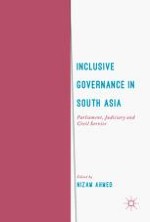2018 | OriginalPaper | Buchkapitel
6. The Inclusivity Role of the Judiciary in Bangladesh
verfasst von : Ridwanul Hoque
Erschienen in: Inclusive Governance in South Asia
Aktivieren Sie unsere intelligente Suche, um passende Fachinhalte oder Patente zu finden.
Wählen Sie Textabschnitte aus um mit Künstlicher Intelligenz passenden Patente zu finden. powered by
Markieren Sie Textabschnitte, um KI-gestützt weitere passende Inhalte zu finden. powered by
